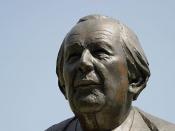Cognitive development is incredibly important when dealing with children because understanding their mental progress and growth is an essential when working with them. Cognitive development is the construction of thought processes, including remembering, problem solving, and decision making from childhood to adolescent (Theory of cognitive development, 2009). Being that a child's thought process is completely different from an adult, many child psychologists have developed their own personal theories on how this procedure occurs.
Cognitive development refers to the way an infant perceives, thinks, and gains an understanding of his/her world through the interaction of genetic and learned factors like processing, reasoning, language development, and memory (Theory of development, 2009). This has been studied by many theorists (Erickson, Piaget, Vygotsky, etc) in various ways that all contribute to our understanding of how children develop. One example of an issue debated within this theory was the emergence of the intelligence quotient, or IQ test, brought on by Lewis Terman.
These tests are used to determine were a child is mentally by obtaining scores that place them in a particular category. IQ tests however are often criticized for being too narrow as well as too biased in regards to race and gender (Cognitive development, 2009). Another example debated within this issue is how behaviorist B.F. Skinner argued that all children are easily influenced and they gain intelligence through positive reinforcement.
Two of the most influential developmental theorist are Jean Piaget and Lev Semionovich Vygotsky who both have very distinct yet some of the same opinions about this topic. Some similarities between the two theories are that both Piaget and Vygotsky's view on the nature or development of intelligence has to do with the acquisition of sign systems which happens in an invariant sequence of steps that is the same for all...



Nicely Done!
This is a very good contrast/comparison of Vygotsky and Piaget. The main point were concisely highlighted so that it make it easy to distinguish between the two psychologists
0 out of 0 people found this comment useful.